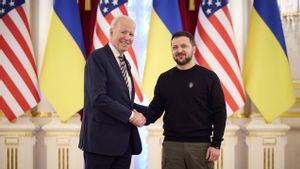JAKARTA - Its troops withdrew from the battlefields in Ukraine three times last year and nearly 200,000 of its men have been killed or injured according to US officials, but Russia's Defense Minister is still in the job thanks to President Vladimir Putin.
The Russian leader has various reasons for keeping Sergei Shoigu in office, according to Western officials, veteran Kremlin watchers and former Western military commanders. As well as being fiercely loyal and helping Putin become president, decision-making in Ukraine is not only his responsibility.
"Loyalty always trumps competence in Putin's inner circle," said Andrew Weiss, a Putin specialist at the Carnegie Endowment think-tank who held various policy roles on the US National Security Council and author of a book about Putin.
President Putin has admitted publicly that he finds it difficult to fire people and usually handles such matters privately, Weiss said.
"Several people in senior positions, whose job performance leaves much to be desired, including Shoigu, have benefited from this underappreciated sentimental side of (Putin's) personality," he said.

The Russian Defense Ministry did not respond to requests for comment about Shoigu or his own performance in Ukraine, where his troops are pushing hard to capture the eastern towns of Bakhmut and Vuhledar.
Shoigu has held key positions in Russia's power structure continuously since the collapse of the Soviet Union in 1991, and served as minister of emergencies under the late President Boris Yeltsin.
Appointed defense minister in 2012, he is part of President Putin's inner circle. Sehoigu is enjoying a hunting and fishing holiday with Putin in his hometown of Siberia.
Tatiana Stanovaya, founder of analysis firm R.Politik and Kremlin watcher, said President Putin prefers to work with people he knows well, regardless of their flaws.
"For him, it was easier psychologically," he said, pointing to a profile Shoigu highlighted in 1999 was one of the leaders of the political party that helped propel Putin to the presidency.

"Since then, Putin has felt indebted to Shoigu," Stanovaya explained in her profile on online media Riddle.
"He has been guaranteed a comfortable place in Russian politics, provided he has not committed any serious wrongdoing."
A source close to the Russian authorities who declined to be identified because they are not authorized to speak to the media cited an old Russian proverb to give another reason why they think it is unlikely that Shoigu will be replaced any time soon.
"You can't change horses halfway," they said, referring to the need to ensure continuity in trying times. The Russian army has learned from its mistakes and is adapting successfully, the sources said.
Meanwhile, a senior NATO diplomat and a senior European Union official said they saw Putin and his generals as the main decision makers in Ukraine, not Shoigu alone.
Stanovaya said Shoigu was focused on managing his broad ministry and its relationship with the defense industry, which meant responsibility for the Ukraine campaign was shared.
"Putin himself works (in Ukraine) with generals, not just with one or two figures, and sometimes gets involved in (battlefield) situations at a lower level," he said.
Chief of the General Staff Army General Valery Gerasimov was appointed last month to run the war in Ukraine, while Air Force General Sergei Surovikin, nicknamed "General Armageddon" by Russian media, was demoted to deputy commander of operations.
Both men, unlike Shoigu, were career military officers. Sergei Markov, a former Kremlin adviser, said Surovikin was still very involved in Ukraine even though he had been demoted.

President Putin and Defense Minister Shoigu. (Wikimedia Commons/Пресс-служба Президента Российской Федерации)
The Kremlin said it would achieve its objectives in Ukraine in what it called a "special military operation", dismissing Western estimates of casualties being exaggerated.
Russian troops still control about a fifth of Ukraine's territory and are suspected by Kyiv of being preparing for a new offensive.
However, the Russian invasion is widely considered to have highlighted the Moscow military, which was pushed back from Kyiv, diverted to northeastern Ukraine, then forced to surrender the southern city of Kherson.
Yevgeny Prigozhin, founder of the Russian mercenary group Wagner, was one of Shoigu's harshest critics, claiming his own men who had spearheaded several attacks in eastern Ukraine were far more effective than the regular army.
Prigozhin has avoided personal attacks in recent weeks since being asked to quit by the Kremlin. He previously called top military officers "bastards" who should be sent to the front with machine guns.

Separately, Igor Girkin, a former Federal Security Service officer who helped launch the conflict in 2014 with a Moscow-backed separatist uprising and now under US sanctions, has repeatedly questioned Shoigu's competence.
"I really want to know when this slacker will finally be court-martialed for his ways of 'preparing our soldiers for war,'" Girkin wrote on his blog this month.
On the other hand, Ben Hodges, a former commander of US Army forces in Europe, told Reuters he thought Shoigu and Gerasimov would be fired because they had not provided troops "capable of carrying out the tasks assigned to them... Russian military performance".
Hodges and Rupert Jones, a retired major general who served as Assistant Chief of the British General Staff, pointed to what they say was the Russian military's poor initial planning, strategy, tactics, logistics, equipment, as well as failed mobilization efforts and problems of corruption.
"It's inconceivable", said Jones, that a Western secretary of defense could keep his job under those circumstances.
SEE ALSO:
"He will definitely be fired, he will definitely fall down because he will see his own failure, or the media or the public will find excuses," he said.
Despite Moscow's lapses in Ukraine, Jack Watling, a senior fellow at the London-based think-tank RUSI, said Shoigu had "massively upgraded" military capabilities and oversaw complex but successful operations before Ukraine.
"So this wasn't just a bluff," said Watling.
The English, Chinese, Japanese, Arabic, and French versions are automatically generated by the AI. So there may still be inaccuracies in translating, please always see Indonesian as our main language. (system supported by DigitalSiber.id)


















